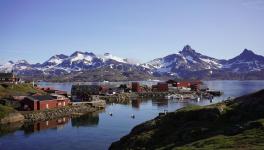CSE’s State of Environment Report: Inching Closer to Ecological Disasters
Representational use only.
Amid an ongoing pandemic and the worsening of climate systems across the globe, the Center for Science and Environment’s State of Environment report cautioned that the world is inching closer to ecological disasters.
The report, released at an online event on February 25, highlighted the degradation of systems that have led to the creation of the COVID-19 pandemic across the globe, and said the world will face pandemics like the current one more frequently. It added that the adult generation of 2040 would be stunted with a lower human capital and that it would be the toughest developmental challenge for the world due to the impact of the pandemic.
“The pandemic has demonstrated another brutal reality: A crisis’s impacts trickle faster to the poor. It is estimated that 12,000 more people would die every day due to hunger extended by the pandemic,” it added.
In a chapter on COVID-19, the report stated: “Deforestation for large-scale industrial animal husbandry is thus tantamount to inviting these viruses into our future most electronic devices are made from materials extracted from mines of metals and minerals, such as copper, nickel, silver and cobalt. Most of these mines are in old forests, which have to be cleared and habitats destroyed to start mining there. That’s how we end up bringing viruses closer to us.”
“We are currently faced with multiple crises, including ones like the ongoing pandemic. Amidst this, it is key to focus on the environmental crisis we are creating which is leading to more vulnerabilities among the marginalised communities, those who are on the front-lines of witnessing the effects of climate change,” Director of CSE, Sunita Narain, said.
The report highlighted how the ongoing climate crisis is creating newer vulnerabilities at the cost of the marginalised communities. “Livelihoods of many workers depend on industrialisation. Their course is restricted use of resources and revival of natural ecosystems. This would mean using resources responsibly and restoring areas back to their original glory after extraction has ended. Urbanisation is increasing and biodiversity diminishing,” it added.
At the launch of the report, Biswajit Mohanty, secretary, Wildlife Society of Odisha, said that India’s ecology and environment “have never faced such enormous pressure and degradation, driven by rapacious corporate interests growth is happening at unforgivable and irreversible damage, sustainability, ecology and law have been cast aside to fatten the balance sheets while our policy makers and regulators are silent.”
Last year witnessed massive campaigns against one of the moves by the Narendra Modi government to pave way for easier environmental clearances for corporates to envisage projects in vulnerable-eco sensitive zones.
CSE has critiqued the EC process and recommended ways in which it can be streamlined (for ease of doing business) and strengthened (for environmental and social integrity). Some of these are to consolidate clearances—environmental, forest, wildlife, coastal—and make the document public so that the project impact is fully understood and decisions taken are timely. The assessment should be openly scrutinised to take care of people’s concerns. The report stated: “Currently, these committees are not responsible to ensure the projects cleared do not have a serious environmental impact. They delay clearances by repeatedly asking for information, or they clear with a list of conditions, knowing the conditions will not be monitored, or may not even be feasible.”
Amid this rapid industrialisation, India’s power plants have already pleaded for a delayed deadline to meet the new standards beyond 2022. The study by CSE has shown that about 70% of the power plants in the country cannot meet the standards by 2022. The recovery package calls for private investments and ease-of-doing business in the coal sector for accelerated commercial coal mining, and removes end-use restrictions. Rules on ash content of coal have been waived off. This will flood the market with dirtier and cheaper coal leading to more vulnerabilities for indigenous populations as well as natural resources. Activist and journalist Patricia Mukhim, while discussing the state of mining in Meghalaya said, “It is being projected as if there is no coal mining, but on the ground, coal mining is ongoing without protocols, polluting river systems causing acid rains from the mining activity.”
The report also elaborated on the ethics of landscape conservation, agro-ecological systems of food production and of controlled fire interventions, among several other methods, as the way forward. It laid special emphasis on the involvement of the indegeous communities to ensure planetary justice.
Get the latest reports & analysis with people's perspective on Protests, movements & deep analytical videos, discussions of the current affairs in your Telegram app. Subscribe to NewsClick's Telegram channel & get Real-Time updates on stories, as they get published on our website.
























